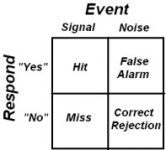gretske, I actually agree with you that Mr. Wahlberg has something of a First Amendment-related civil rights beef with CT State. But in pragmatic terms, I stand by what I said: once alerted, the campus police had, effectively, no choice but to look into his professor's concerns.
Since some of us have been talking about this in terms of signal detection theory, let me make this a bit more explicit, as I think it's a useful way of thinking about what's actually going on here. The following is a sort of simple-minded graphical representation of how the theory works:

To keep this very simple, let's say that two things determine the relative probabilities of responses in each of the 4 categories in the box above: the signal-to-noise ratio (how hard the signal is to detect), and the motivation of the observer, which is determined, among other things, by the relative consequences of hits and misses. In the case we're discussing, call the "signal" that needs to be detected "wacko-who's-about-to-shoot-up-the-campus" -- "wacko" for short. As Glenn Meyer has pointed out, detecting wackos is really hard to do before the fact, which is another way of saying that there's a lot of noise. Now consider the consequences of hits, misses, correct rejections, and false alarms (or false positives).
A hit: A wacko is found, prevented from acting, and lives are saved.
A miss: A wacko kills a bunch of people.
A correct rejection: Mr. Wahlberg's feelings are spared. No one hears about any of this.
A false alarm: Mr. Wahlberg's feathers are ruffled, the U. takes some flak, and people on gun forums get to agonize about his civil rights.
Now, if you're the campus police, your overriding concern is to avoid misses, for obvious reasons, so the probability of false alarms goes way up. The risk of another campus shooting (and of the lawsuits that will result if it gets out that they were alerted that someone might be dangerous and they did nothing) will far outweigh
even your concerns about a civil rights lawsuit.
So, yes, they ask him to come in for a little chat about his guns.
A correct rejection would have been nice, in principle: the police could have listened to Professor Anderson's concerns and said, "No, he sounds like just a normal guy who's expressing a belief in the 2nd Amendment."
But does anyone
seriously think this was likely, given the consequences of a "miss" coupled with the fact that the campus police would be held responsible?? Give me a break.
theotherTexasRich said:
Fear. It's a powerful thing.
Exactly.

